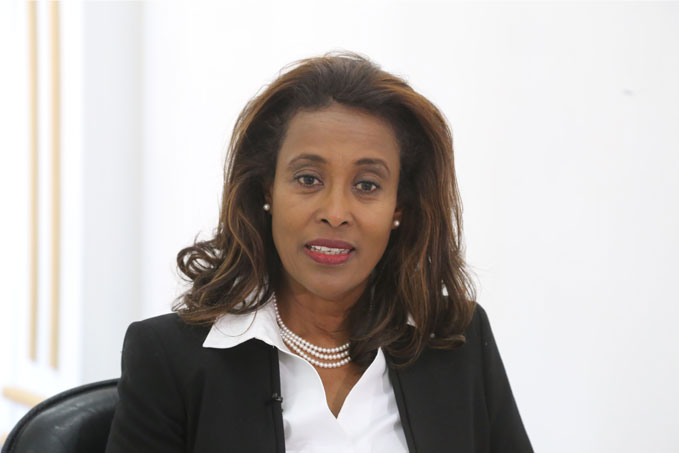
Agenda | Sep 21,2019
Mar 30 , 2019
By KALIKIDAN HAILU ( FORTUNE STAFF WRITER )
 Meaza Ashenafi, chief justice
Meaza Ashenafi, chief justice A proposal for the formation of a vetting commission for judges is facing strong opposition from some legal circles.
The vetting commission was proposed to check on the background of judges, investigate judges that have a history of complaints lodged against them and forward its recommendations to the Federal Judicial Administration Council for final action.
Proposed by the Office of the Chief Justice, Meaza Ashenafi, the commission is intended as a vehicle to restore public trust to the courts and justice system of the country and was presented at a stakeholder discussion on Saturday, March 23, 2019, at Capital Hotel on Haile G. Selassie Avenue.
Abeba Mulat, an outside consultant, hired by the Office of the President of the Supreme Court to advise on the reform process came up with the idea to solve issues related to human resource administration in the court system.
"Different complaints have been lodged accusing some judges of bias, corruption and for having affiliations with political parties," said Solomon Ejigu, communications director at the Federal Supreme Court.
The plan for the commission is to be temporary, with a life span of half a year, with the possibility of extension for two months.
It will have nine members of which two-thirds will be lawyers with at least 15 years of experience.
Chaired by Meaza and her deputy, Solomon Areda, the discussion was attended by lawyers, academics and judges who strongly opposed the formation of the commission.
The complaints against the formation of the commission ranged from accusations of contradiction with the law; overlapping of duty with the Judges Administration Council; being a tool for political purposes; a counterproductive process that erodes confidence among judges; and a means that will result in a high turnover of judges.
Tilahun Teshome (Prof.), a lecturer at Addis Abeba University School of Law, strongly opposed the formation of the commission.
"The recommendation doesn't look like a legal document," Tilahun said. "It looks more like a political document."
Tilahun said that the Dergueand the current ruling party have made similar attempts previously using the process as a tool to target some judges.
Attendants also argued that the drafting process has excluded certain stakeholders, such as the Law & Justice Advisory Council. The Council has 17 members and three subcommittees to recommend reforms in the legal system to the Prime Minister and is chaired by Webeshet Ayele.
During the same session, the Advisory Council presented a bill for the re-establishment of the Federal Judicial Administration Council for discussion. The amendment focuses on the powers of the Council, its membership composition and representation.
Making the courts independent, impartial, accountable and trustworthy are the major reasons for the amendment of the proclamation, according to Mandefrot Belay, chairperson of the subcommittee under the Advisory Council.
PUBLISHED ON
Mar 30,2019 [ VOL
19 , NO
987]

Agenda | Sep 21,2019

Radar |

Exclusive Interviews | May 17,2025

Fortune News | Oct 03,2020

Radar | Dec 01,2024

Dec 22 , 2024 . By TIZITA SHEWAFERAW
Charged with transforming colossal state-owned enterprises into modern and competitiv...

Aug 18 , 2024 . By AKSAH ITALO
Although predictable Yonas Zerihun's job in the ride-hailing service is not immune to...

Jul 28 , 2024 . By TIZITA SHEWAFERAW
Unhabitual, perhaps too many, Samuel Gebreyohannes, 38, used to occasionally enjoy a couple of beers at breakfast. However, he recently swit...

Jul 13 , 2024 . By AKSAH ITALO
Investors who rely on tractors, trucks, and field vehicles for commuting, transporting commodities, and f...

Jul 5 , 2025
Six years ago, Ethiopia was the darling of international liberal commentators. A year...

Jun 28 , 2025
Meseret Damtie, the assertive auditor general, has never been shy about naming names...

Jun 21 , 2025
A well-worn adage says, “Budget is not destiny, but it is direction.” Examining t...

Jun 14 , 2025
Yet again, the Horn of Africa is bracing for trouble. A region already frayed by wars...